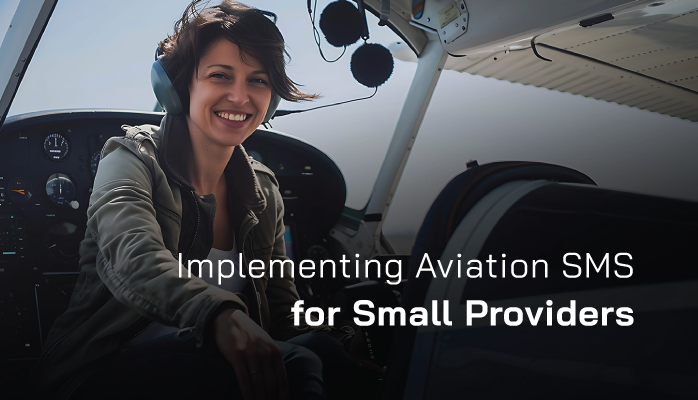Why Small Operators Need Safety Management Systems

Aviation safety management systems (SMS) are not just for large airlines and airports with high traffic volumes.
Small aviation service providers are in just as much need of implementing formal aviation SMS as are larger operations. All operators use the same SMS implementation guidelines as larger operators; however, they are not evaluated equally, as larger operators logically fall under higher regulator scrutiny than smaller operators, as the volume of their business implies greater risk.
Of course, small and large service providers will have different strategies for satisfying regulatory requirements, but the same principles and benefits of safety management systems apply to both large and small aviation service providers.
Related Aviation SMS Implementation Articles
- Why Should We Implement Aviation SMS?
- Overview of 4 Phases of Aviation SMS Implementation With Free Resources
- How to Create Aviation SMS Implementation Plan - With Templates
Small Operators Don’t Benefit From Aviation SMS as Quickly
To be fair, I would say that larger operators benefit more quickly from SMS implementations than smaller operators. I state this when I consider the lack of substantive safety reports entering the system for smaller operators. Since larger operators have more cycles/operations, they are exposed more frequently to the risk and subsequently, more opportunities to "practice" their processes to determine shortcomings. These "opportunities for improvement" will enter the SMS risk management process in the form of reported safety issues and audit findings.
Compared to larger operators, smaller operators have significantly reduced volumes of operational activities to monitor. Smaller service providers lack the "critical mass" of potential safety reports that will "work out the operational bugs in the shortest possible time;" however, smaller operators will still benefit from the required SMS implementations.
These benefits of aviation SMS implementations for all operators include:
- Operations are dependent on procedures rather than persons, which is a much safer long-term mode of operation;
- Less exposure to just about every type of risk;
- Improved operational quality;
- Better assurance against reputation damage;
- Better long-term financial forecast (safety incidents often result in a financial loss); and
- Better work environment for employees (unsafe environments are terrible for employee morale, just ask any human resources manager).
In real-world operations, small service providers often don’t adopt a safety management system because they:
- Don’t feel that SMS risk management processes apply to small operations;
- Don’t have the budget (or won’t make room for it) for implementing an aviation SMS;
- Don’t see any business value; and/or
- Don’t see the “need" due to lack of consistent oversight.
However there are good reasons for small aviation service providers to implement an aviation safety management system. Here are 3 of the top reasons that highlight the importance of aviation SMS for small service providers that may not appear obvious at first glance.
Safety Program Is a Quality Management Concern

For smaller operators, safety management and quality management go hand in hand. With limited financial resources, if a small operator becomes notorious for unsafe operations, they can easily be driven out of business.
The basic fact is that the most important thing for a small operator is to prove that they are:
- Safe;
- Consistent;
- Compliant; and
- Reliable.
Having worked and flown with many small operations, I can say that by far these are among the most important factors in consumers’ minds. For this reason, a safety management system for small operators goes hand in hand with quality management.
The safety/quality SMS concern will only become more prevalent as the service provider’s business grows. Without a safety program in place, growth for small operations is likely to be a bumpy (and costly) ride.
The safety/quality consideration is not a valid argument for small operators to invest in implementing a quality management system (QMS) in parallel with the SMS implementation. Integrated SMS and QMS are typically implemented in large operations that already have resources to manage the existing QMS components.
The point is that the SMS' risk management processes if applied consistently, will also markedly improve operational quality. This is a huge benefit that must not be summarily discounted by accountable executives who halfheartedly accept the SMS mandate and grudgingly implement the SMS.
Related Articles on Integrated SMS and QMS in Aviation
- QMS Programs vs Aviation Safety Management Systems (SMS)
- 5 Easy Ways to Combine QMS and SMS in Aviation Operations
- What Are Differences of Aviation Safety Management Systems (SMS) and QMS Programs
SMS Program Will Make a Difference in Safety
Small aviation operators work with small teams, all/most of whom are talking and interacting together on a regular basis. The success of safety operations usually hinges significantly more on each individual than in larger organizations, because in smaller organizations there is not a team of people around to catch mistakes.
The reliance on individual people in small operations makes most small operators feel like a fully implemented safety management system is not necessary. They may feel that the SMS initiative is simply a regurgitation of the traditional safety program. You may remember the traditional safety program where:
- Management was not involved or very minimally;
- Safety information was not regularly communicated to staff;
- There was no accountability for management oversight; and
- Employees seldom learned of mitigation strategies applied to their reported safety concerns.
The unfortunate fact is those small operators are exposed to increased risk simply because they generally do not wholeheartedly adopt formal safety management systems. A sad example is the case of two competing local airlines that fly to remote villages.
- One of the operators DOES have a dedicated safety management system and is well known in local communities for their safety (I used to live in one of these small communities); and
- The other operator is notorious for being unsafe because of repeated accidents (they just had another one week ago) and they do NOT have dedicated SMS support.
Reliance on people, as opposed to a system, creates vulnerabilities especially:
- During employee turnover; and
- During high-pressure situations, when pilots/employees don’t have dedicated procedures to fall back on for decision-making.
Increase Business by Advertising Safety Program
For the most part, people in the general public have no idea what SMS is or that a safety management system even exists. They also don’t know what safety measures airports and airlines even have.
Small operators usually work very closely with customers. For example, small airlines that fly to remote areas usually only carry 4-8 passengers with a single pilot, which means the pilot is talking directly to each customer when he/she gives instructions. With such small operators, customers almost always make reservations directly with the operator.
This up close and personal relationship provides an opportunity that larger operators don’t have, namely about having a dedicated and highly visible SMS that competitors probably don’t have.
The rationale behind doing this is the exact same as why most car companies go out of their way to highlight high safety ratings: when it comes to transportation, safety is a major concern for many consumers (if not a deciding factor).
If a customer is going to choose between two small operators and one operator has an advertised aviation SMS while the other doesn’t, whom do you think customers would rather choose?
Related Aviation SMS Implementation Articles
- 43 Benefits of Aviation Safety Management Systems (Proven)
- How to Complete Phase 1 of Aviation SMS Implementation [With Free Checklist]
- Are Aviation SMS Implementations Different for Airports, Airlines, MROs?
Final Thought: What Kind of SMS?
Transport Canada apparently agrees with this article, as they have now made it mandatory for many small service providers to have an aviation SMS in place. As pointed out, large and small service providers have different needs and thus require different SMS data management strategies. A small service provider would do well to start with SMS data management tools that are relevant to the scope of their operations, such as:
- Safety reporting system to allow stakeholders to report safety concerns to management;
- Risk Management tools to document risk management activities;
- Basic risk analysis charts to monitor SMS performance and present data for analysis;
- SMS training tools, such as for initial and recurrent aviation safety training;
- Safety communication tools, such as email or electronic messages on a bulletin board;
- Simple safety goals and objectives tracking system with KPI management features;
- A list of company safety policies and procedures.
A very difficult task for smaller operators is to develop and document their risk management processes. This does not have to be rocket science.
Do you have well-defined, documentation for your risk management workflows? If not, the cheapest and quickest way to acquire these processes is to subscribe to an aviation SMS database software that already has this documentation prepared, ready for you to edit can adjust to fit your operations.
Since 2007, SMS Pro has been working with small to mid-sized operators (under 1,000 employees) on their SMS implementations. We provide one of the most well-known SMS databases.
SMS Pro comes with an SMS manual template that allows you to quickly create your SMS manual within a day or two. If you are looking for industry-accepted, SMS data management tools, SMS Pro has everything you will need for a compliant SMS implementation, regardless of where you operate in the world.
Learn how you can benefit from SMS Pro's risk management processes and data management tools. These short demo videos will show you the flexibility of SMS Pro. The Hazard Reporting Solution is adequate for most very small operators, but if you need a complete system without worrying whether you are missing out on any required tools, I recommend the Safety-Quality Assurance Solution.
Last updated in January 2025.






